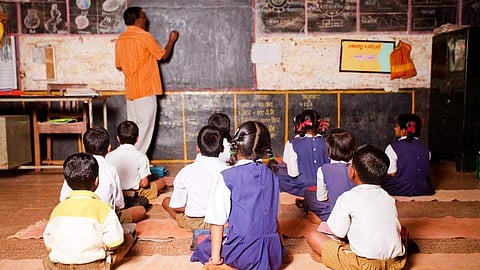

A society that celebrates its teachers is a blissful society. Teachers’ Day celebrations are an opportunity for the teaching fraternity to reflect on the role played by teachers.
Recently, the 50-year old English Language Teachers’ Association of India (ELTAI) celebrated teachers and their selfless service to the nation by organising a three-day event online. I was asked to share my reflections on the poem Teacher by Professor Alan Maley whom I have interviewed for various publications. Earlier, I was asked to contact the poet and get his video reading of the poem. As promised, Professor Maley, who has been involved with English Language teaching (ELT) for over half a century, sent me the video and it was played on the first day of the ELTAI Teachers’ Day celebrations.
Here is the poem:
What do you do?
I’m a teacher.
What do you teach?
People.
What do you teach them?
English.
You mean grammar, verbs, nouns, pronunciation, conjugation, articles and particles, negatives and interrogatives …?
That too.
What do you mean, ‘that too’?
Well, I also try to teach them how to think, and feel – show them inspiration, aspiration, cooperation, participation, consolation, innovation …
help them think about globalization, exploitation, confrontation, incarceration, discrimination, degradation, subjugation, …
how inequality brings poverty, how intolerance brings violence, how need is denied by greed, how –isms become prisons, how thinking and feeling can bring about healing.
Well, I don’t know about that. Maybe you should stick to language, forget about anguish. You can’t change the world.
But if I did that, I’d be a cheater, not a teacher.
What a thought-provoking poem it is! I have used the poem in a few of my webinars and ELT workshops in order to help teachers reflect on their role in society.
It is a provocative conversation between a creative, reflective, productive and socially conscious English language teacher and an ordinary person (or an ordinary teacher) who thinks that the teacher’s role is limited to teaching the content prescribed in the syllabus.
When the ordinary teacher says “Maybe you should stick to language, forget about anguish.
You can’t change the world” the socially conscious teacher replies, “But if I did that, I’d be a cheater, not a teacher”. What a “provocative” reply! It makes all teachers think about whether they are teachers or cheaters.
Three years ago, when I interviewed Alan Maley, I asked him the question: “How important is it for a teacher of English to talk about global issues and human anguish in the English class?”
This was Alan Maley’s response:
“I do indeed believe language teachers are not just teachers of language. I think the notion of the language teacher as some kind of technician is an impoverished view. My view is of the teacher as an educator, which involves far more than instilling the mechanics of the language. Students learn from their teachers not just what they happen to be teaching. I think therefore that teachers have a duty to enter into genuine interaction with their students, and not to hide behind a screen of expertise…”
Alan Maley, who served as the British Council’s South India Regional Director between 1984 and 1988 and the President of the International Association of Teachers of English as a Foreign Language (IATEFL), has inspired teachers across the globe. I must say that he has had a positive impact on my thinking and teaching too. The poem made me think about the role of teachers in the twenty-first century.
Here I would like to make a distinction between teachers and educators. When do teachers become educators?
Teachers are instructors and they focus only on academic activities whereas educators possess “teacher+ qualities” which makes them different from ordinary teachers. They go beyond the syllabus and enable students to become critical thinkers. They believe that the goal of education is to create informed citizens.
Teachers become educators when they realise that they have a deep sense of responsibility towards society and feel the need to act as agents of social change. Educators are not mere givers/sharers/creators of knowledge; they enable students to think creatively, critically and productively. Educators are teachers who believe that they have a mission to save the world from disasters and make it a better place to live in. Educators are teachers who believe that it is their mission to foster a sense of social responsibility in students.
English language teachers cannot call themselves successful if they produce students who have no social conscience or who use their English language skills for destructive purposes or exploitation
Education is a beautiful concept. What is the opposing concept of education? Noam Chomsky’s response to the question is: “The opposing concept of education is indoctrination.”
Teaching only the content may result in information and indoctrination. Education which enables people to think will result in knowledge and wisdom. Indoctrination enslaves people whereas education liberates people. The role of educators is to liberate people and not to enslave them.
On the occasion of Teachers’ Day, teachers should ask themselves whether they want to be known as teachers or cheaters.
